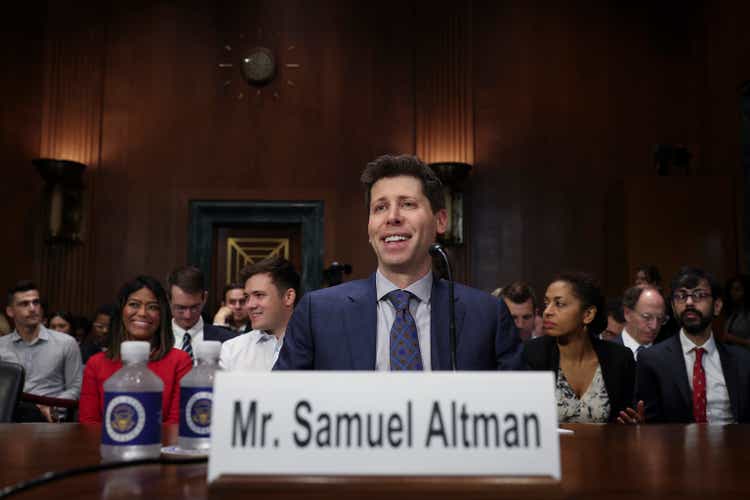
Win McNamee
OpenAI faces a number of challenges if it pursues an initial public offering in the future, chief among them, rewriting its charter.
“The problem really is, OpenAI was not set up to be a money-churning cash cow, but rather a project to control AI’s development and path through leadership to ‘benefit humanity,'” said Seeking Alpha analyst Joe Albano via email.
“That doesn’t align with going public,” he added. “Who’s going to invest in a company where their purpose isn’t profits?”
Its latest funding round is attempting to reach $6.5B, and propel the startup’s valuation to $150B. This would make the Sam Altman-led company the most valuable artificial intelligence startup on the planet.
Although Altman has not announced a plan for OpenAI to go public, the recent hiring of a chief financial officer, recent acquisitions and a towering valuation indicate it might be headed in that direction. OpenAI has also reportedly discussed with its lawyers about converting its non-profit structure to a for-profit benefit corporation.
Seeking Alpha analyst Uttam Dey believes OpenAI will eventually pursue an IPO, but not within the next 12 months.
“It might take more time given its complex holding structure where OpenAI continues to operate as a non-profit company,” Dey said. “OpenAI’s current corporate structure puts a profit cap on its investors, making them jump through hoops if they need to access liquidity.”
“Still, OpenAI seems determined to resolve this and move ahead in my opinion,” he added. “The recent hire of Sarah Friar as its CFO strongly indicates OpenAI’s determination to prep the company towards a possible IPO.”
Friar has extensive experience in capital markets. The 51-year-old Friar worked at Goldman Sachs before joining Block (SQ) — then known as Square, in 2012. She helped lead the company through its 2015 IPO and became Chief Executive Officer for Nextdoor (KIND) in 2018. Nextdoor went public in 2021.
Pros and cons of being public
Early investors in OpenAI, such as Microsoft (NASDAQ:MSFT), would stand to benefit the most if the startup goes public. OpenAI would also gain access to broader sources of liquidity and capital.
However, becoming a publicly traded company also has its costs, including increased regulatory scrutiny, operational overhead and higher shareholder transparency.
“Going public might actually help the company get more disciplined, given that it burns through $5-7B annually,” Dey added.
Seeking Alpha analyst Gary Alexander finds OpenAI has options to improve its profitability, but it might take time.
“In addition to adding on to its subscription offerings and revenue model, I also believe a public offering will have the benefit of adding further legitimacy that will help OpenAI close enterprise deals,” Alexander said. “Still, it seems the biggest advantage for the IPO will be to create liquidity for its founder and investors.”
He doesn’t recommend initially buying OpenAI shares after the IPO due to a likely inflated valuation and demand. Dey also said the stock would likely be very volatile in the beginning.
Palantir’s (NYSE:PLTR) IPO in 2020 provides a good comparison.
“After a sharp initial run-up, Palantir shares quickly eased off gains, and it took years for the company to start rallying again on its fundamental merits, and not just sentiment,” Alexander noted.
A public OpenAI might also encourage competitors, such as Microsoft and Google (NASDAQ:GOOG)(NASDAQ:GOOGL), to create a new reporting segment for AI, he added.
If OpenAI does become public, it means the company “is having a change of heart and realized it needs more funding to drive revenue so it can push Sam Altman’s chip foundry dream, for example, or management has realized it can’t become useful in the AI race unless profits are the goal,” Albano said.
